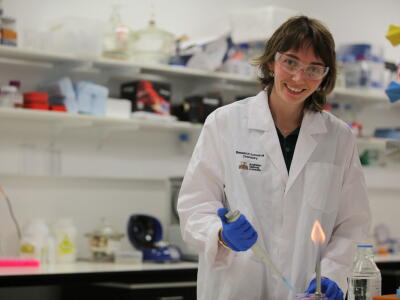Taiwan-ANU scholarship supports Wei-Ting’s vision for the future of 3D audio
Posted on
Based at The Australian National University (ANU) College of Engineering, Computing and Cybernetics (CECC), Wei-Ting is currently pursuing a PhD in audio and acoustic signal processing.
“I find sound particularly beautiful, and I wanted to combine my passion for it with my study and career,” he says.
Wei-Ting joined the ANU in August 2022 through the Taiwan Australian National University scholarship and says the main reason he chose ANU was to connect with Professor Thushara Abhayapala, whose work in audio and acoustic signal processing he has long admired.
Wei-Ting, who holds a master’s degree in engineering science from National Taiwan University, says his PhD is focused on 3D audio.
“My goal is to use simulation to recreate a 3D auditory experience, which we call ‘sound feel’. We use our ears to not only hear, but to also sense sound coming from every direction,” he says.
“This allows people to transport themselves into a virtual reality that is so lifelike, they can almost believe they’re in the real world.
“Imagine a future where we might exist in a simulated universe, and yet, our ability to perceive sound from all directions remains unchanged; this is the essence of my research.”
The Taiwan Australian National University scholarship is offered through the Taiwanese government to encourage students to pursue PhDs at top global universities. Wei-Ting describes it as “win-win”, where the Taiwanese government covers half the cost, and the university covers the other half.
The scholarship program has just been extended to 2028 and provides tuition fees and stipends for up to five Taiwanese students per year over five years.
“Taiwanese students must apply through the Taiwanese government website, write documents in Chinese, and inform their potential supervisor that they have applied,” Wei-Ting says.
He arrived in Canberra in August 2022, and his first impression was – it’s quiet.
“I lived in Taipei, a big, noisy city, all my life. The shops are open late, there are night markets everywhere. In the evening in Canberra, everything is closed, even the shopping mall,” he says.
“However, I soon found I liked the peaceful atmosphere. You can just enjoy yourself and focus on your research. Also, Taiwanese are generally quite introverted but here, I can feel free to talk to everyone and that's wonderful.”
Wei-Ting says he loves the Australian way of life, friendliness and the feeling of family he has here, but at first some things were a bit surprising.
“I was having lunch with colleagues, and my supervisor joined us and started chatting about his house, his family, his dog – I found it so interesting because I couldn’t imagine this happening in Taiwan. My previous supervisor was also very kind, but we would only talk about research,” he says.
“Our study group is like a family. We arrange events like potluck dinners, weekends away – it’s beautiful and more connected here, I guess.”
One way he does feel more at home is living off-campus in Braddon with a fellow Taiwanese PhD student – he says it’s a great location, and while it’s no Taipei, it’s a little more lively than other parts of Canberra and he appreciates how multicultural it is here.
“I love it because I can go to an Indian restaurant to enjoy authentic food, or to the German Club to enjoy traditional pork knuckle,” he says.
“The only thing is, I haven’t been able to find an authentic Taiwanese restaurant yet. My cooking is getting better though, and I’ve learned to make myself excellent beef noodles and oyster pancakes.”
He’s also noticed some differences in teaching and learning styles between Taiwan and Australia. As part of his PhD, he’s tutoring a Microcontroller 4213 course and guides students in their lab work.
“Given the complexity of the tasks, most students struggle to finish within the allotted three-hour time frame, so our role is to help them streamline their efforts to achieve the desired outcomes more efficiently,” he says.
“This tutoring experience is quite unique compared to tutoring roles in Taiwan, which primarily involve grading. In Australia, our focus is on assisting students in completing their assignments and work out how to provide hints and guidance, so they work out the answers for themselves.”
Following the completion of his PhD, Wei-Ting’s goal is to get a job in audio engineering.
“The great thing about studying at ANU is that once international PhD students graduate, they can apply for permanent residency. I plan to do that and see if I can find a good opportunity in Australia,” he says.
“I’m also open to moving anywhere for the right role.”
In the meantime, he’s planning to head home to Taiwan for the Christmas break, and he’s most looking forward to the food.
Deadline for 2023 Taiwan-ANU PhD Scholarships: 30 November 2024. Study must be commenced between 1 May 2025 and 31 August 2025. More information here.
You may also like
Life as an Industry PhD candidate: Rosie Georgelin
PhD candidate Rosie Georgelin is working with industry partner Samsara Eco to push boundaries in infinite plastic recycling.
How Chloe’s PhD partners with industry for plastic solutions
PhD candidate Chloe Gomez is working with industry partner Samsara Eco to push boundaries in infinite plastic recycling.
